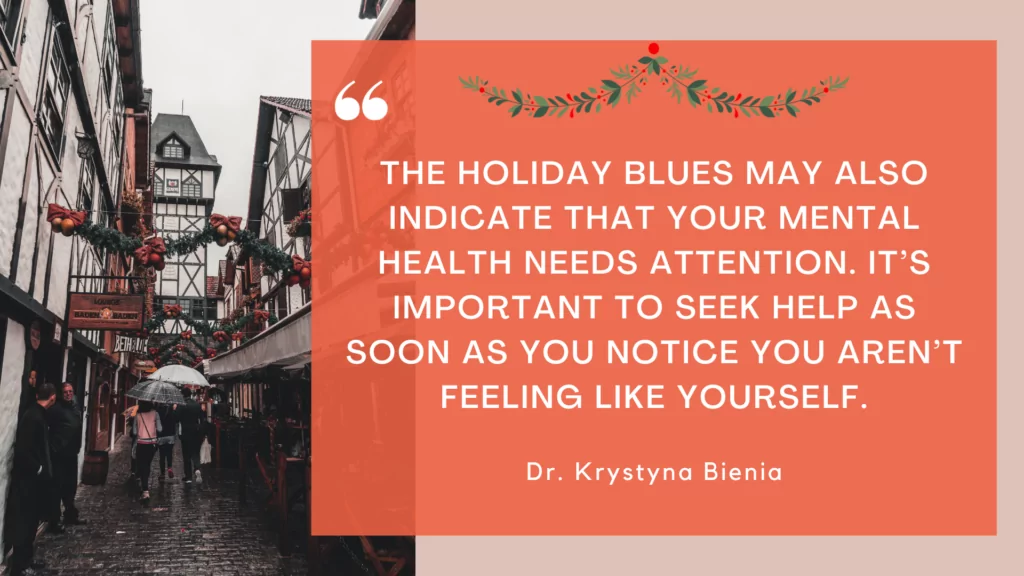The ‘most wonderful time of the year’ is finally here, and while it may be a joyous occasion for many, some individuals tend to struggle with keeping their mental health stable during the holiday season. Many people are usually focusing on buying gifts to give their loved ones or travel plans during their winter break. Although prioritizing yourself is essential, it’s typically put on the back burner during the holidays. If seasonal depression or simple mood swings are something you suffer from, specifically during the holidays, we have a guide that can aid you in the process of maintaining your mental health.

✅ AI Essay Writer ✅ AI Detector ✅ Plagchecker ✅ Paraphraser
✅ Summarizer ✅ Citation Generator
Key Takeaways
- The holiday time can heighten mental health issues like seasonal depression. It’s crucial for students to recognize this and seek appropriate support, including on-campus resources or practicing self-care.
- Simple changes in daily routines, such as healthier eating, staying hydrated, incorporating exercise, and regulating sleep patterns, can significantly improve mood and overall mental health.
- Creating a balance between work, social life, and personal time is key to preventing burnout and managing mental health. Engaging in free or low-cost hobbies and setting boundaries can help maintain a healthy mental state during the holidays.

Managing your mental health during the holiday season is not something that you should take lightly.
“The holidays can affect us in ways that aren’t aligned with how we think we’re ‘supposed’ to feel.”
Dr. Krystyna Bienia, senior policy analyst at the Defense Health Agency for Tricare.
“This can lead to what some people call the ‘holiday blues.’ But the holiday blues may also indicate that your mental health needs attention. It’s important to seek help as soon as you notice you aren’t feeling like yourself.” Getting the proper help doesn’t always require an expensive fee. College students can contact on-campus therapists, for “free or low-cost” medical care, according to Big Future. Tricare suggests practicing self-care to better tackle your mental health needs, sometimes it may not be as bad as it feels.
Changing Daily Routine to Improve Mental Health
Eating healthier will increase your mood and give you the energy for your daily lifestyle. Your diet plays a major role in how you think and feel, that’s why it is vital that you nourish your body with nutritious foods, juices, and plenty of water for hydration. You could be feeling tired when in actuality you may be dehydrated. CNet reports:
“Without water, the brain can’t get enough of the amino acid tryptophan needed to create serotonin, also known as the ‘feel good’ chemical.”
CNet also adds that serotonin “regulates mood.” Therefore if you want to feel happy or in better spirits, drink more water.
If you want to create a brighter mood, incorporate more activities into your everyday routine. Exercising allows the body to release endorphins which can boost your overall health.
“A recent study done by the Harvard T.H. Chan School of Public Health found that running for 15 minutes a day or walking for an hour reduces the risk of major depression by 26%,”
Help Guide notes.
Working out helps the body in many different ways including sleep improvement, stress reduction, self-esteem boosting and more, Ben Singh, lead author and research fellow at the University of South Australia notes per Greater Good Magazine.
While exercising can give your mind a boost, getting the proper amount of rest is equally important. You may not be as depressed as you think, instead, you could simply be lacking. sleep. Consider setting a realistic bedtime for yourself with no TV, phone, or additional lights that may keep you awake at night. There are a lot of distractions that suddenly require your attention when it’s time to get some shut-eye — aimlessly scrolling on social media is a prime example. This can easily keep you from getting your much-needed rest, that’s why it’s also important to mind your screen time.
“[Nighttime scrolling] often happens when something during the day, like at work or in a relationship, feels very out of control, so at night, the mind attempts to gain control over those emotions by pushing them away,”
therapist Meg Josephson, MSW explains in a video shared on Instagram.
Socializing and Creating Healthy Boundaries
Sometimes poor mental health can be a result of burnout, which can also be caused by a poor work-life balance. Learning to create healthy boundaries between your work, family, social, and other parts of your life is a key step in managing your mental health.

As a college student, you’re given a schedule that essentially was created with an adviser. In most cases, you’re encouraged to consider proper time management. This way you are not overbooking your daily schedule, enrolling in classes with zero time for yourself — whether it be to study, rest, participate in extracurricular activities, or others. Burnout is very real and, if such free time isn’t included, it could negatively impact your mental state.
The hustle-and-grind culture creates a false narrative that you do not need healthy boundaries. Or, if you’re out having fun with friends, you will fail in life. In reality, that may not necessarily be the case — especially if you particularly struggle with seasonal depression during the holidays. Your fully charged social battery may just need to be put to use. Go out and enjoy yourself!
Studies have shown that teens are specifically dealing with depression, loneliness, and anxiety and it could be due to social media.
“Since 1976, the number of times per week teens go out with friends — and without their parents — held basically steady for nearly 30 years. In 2004, it slid a bit. Then in 2010, it nosedived.”
NPR reports
Finding New Hobbies to Soothe You
Depending on how you define a self-care day is completely your prerogative. However, if you fear that organizing such a time requires a lot of funding, maybe you should consider activities that don’t require money. Finances should never be a determining factor for your mental health. This means, that if your funds are low then your mood shouldn’t have to be negatively impacted as well. If you allow money to be at the center of regulating your mental health, it may never be right. This is not to say that money can’t help in relieving stress and anxiety, but there should also be other, free alternatives.
Here are examples of free places to visit and activities to do that can help to relax your mind:
- Having a picnic in a park
- Exploring a hiking trail
- Checking out new books in a library
- Doing beach yoga (of course if you live near a beach)
- Creating a vision board party at home with friends and family
- Riding around town to see the holiday lights
Exploring new hobbies that make you step out of your comfort zone can be life-changing. However, there is absolutely nothing wrong with having pastimes that cost money. Whether it be to go to the spa or travel to a resort on an island, the main goal is to do what makes you happy.
During the holidays some people struggle with the feeling of isolation, and it’s mainly rooted in the person focusing on the lack thereof. The easiest way to kick those negative thoughts to the curb is to write a list of things that you are grateful for. According to Tomeka McGee-Holloway, Psy. D., ATR, the benefits of having hobbies can aid in more than just confidence boosting, it can also “reduce stress, improve optimism, and even ease symptoms of depression,” Real Simple suggests. It’s all about having something to look forward to, that brings you pure enjoyment.
Care Patron recommends participating in mind-stimulating activities. Consider trying new things that challenge you to think differently or harder, including putting together a puzzle, reading a new book or even taking on a new skill — these things “can create new brain pathways and strengthen your mental resilience.” Sometimes when we are stuck in our ways we aren’t being challenged enough and that can also lead to other mental health issues.
Decorate Your Home
Decorating your home for the holidays can make a big difference in how you feel during winter. But why is it necessary and worth the effort to make your space cozy and uplifting? Well, decorating brings warmth and cheer to your surroundings. It creates a sense of happiness and comfort, especially during the darker, colder months.
When you walk into a decorated home, it feels welcoming and can lift your spirits. Adding things like Canvas Prints with motivational quotes or family pictures can add a personal touch that soothes your mind and makes you feel connected to what matters most.
Now, decorating your home doesn’t have to be elaborate or expensive. Even small touches can make a big difference in how you feel. By creating a cozy and uplifting environment, you can make the winter season more enjoyable and comforting for yourself and your family.
The Key Point
As the holiday season approaches, so will the creep of mental exhaustion. Take some time to prioritize your needs, rest, and most importantly, give yourself grace.
You May Also Find Interesting:
- Why You Can’t Stop Scrolling on Your Phone Before Bed, and How To Break the Pattern
- 33 Mental Health Activities, Exercises & Questions by Care Patron
- What Type of Exercise Is Best for Mental Health? – Greater Good Magazine
- The truth about teens, social media and the mental health crisis, n NPR Report
Follow us on Reddit for more insights and updates.





Comments (0)
Welcome to A*Help comments!
We’re all about debate and discussion at A*Help.
We value the diverse opinions of users, so you may find points of view that you don’t agree with. And that’s cool. However, there are certain things we’re not OK with: attempts to manipulate our data in any way, for example, or the posting of discriminative, offensive, hateful, or disparaging material.